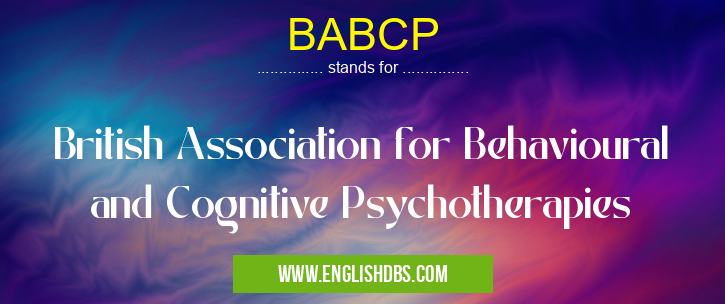What does BABCP mean in RESEARCH
BABCP stands for the British Association for Behavioural and Cognitive Psychotherapies. It is a professional organization that represents practitioners of behavioral and cognitive psychotherapy (CBT) in the United Kingdom. The BABCP's mission is to promote the development and dissemination of CBT, and to ensure the quality of CBT training and practice.

BABCP meaning in Research in Academic & Science
BABCP mostly used in an acronym Research in Category Academic & Science that means British Association for Behavioural and Cognitive Psychotherapies
Shorthand: BABCP,
Full Form: British Association for Behavioural and Cognitive Psychotherapies
For more information of "British Association for Behavioural and Cognitive Psychotherapies", see the section below.
What is CBT?
CBT is a type of psychotherapy that focuses on changing unhelpful thoughts and behaviors. CBT is based on the idea that our thoughts, feelings, and behaviors are all interconnected, and that by changing one, we can change the others. CBT has been shown to be effective in treating a wide range of mental health problems, including anxiety, depression, and eating disorders.
The BABCP
The BABCP was founded in 1972. It is a membership organization that is open to anyone who is interested in CBT. The BABCP offers a range of services to its members, including training, continuing professional development, and networking opportunities. The BABCP also works to promote CBT to the public and to policymakers.
The Role of the BABCP
The BABCP plays an important role in the development and dissemination of CBT in the UK. The BABCP provides a forum for CBT practitioners to share ideas and best practices. The BABCP also works to ensure the quality of CBT training and practice by accrediting CBT training programs and therapists.
Essential Questions and Answers on British Association for Behavioural and Cognitive Psychotherapies in "SCIENCE»RESEARCH"
What is BABCP?
BABCP (British Association for Behavioural and Cognitive Psychotherapies) is the leading professional body for cognitive and behavioural psychotherapists in the UK. Its mission is to promote excellence in cognitive and behavioural psychotherapy (CBT) through training, accreditation, and research.
What is CBT?
CBT is a type of psychotherapy that focuses on changing unhelpful thoughts, feelings, and behaviours. It is based on the premise that our thoughts, emotions, and behaviours are interconnected and that by changing one, we can change the others.
What are the benefits of CBT?
CBT has been shown to be effective in treating a wide range of mental health conditions, including anxiety, depression, phobias, and eating disorders. It can help people to manage their symptoms, improve their coping skills, and live more fulfilling lives.
Who can benefit from BABCP?
BABCP provides a range of services to professionals, including training, accreditation, and support. Its members work in a variety of settings, including the NHS, private practice, and academia.
How do I become a BABCP member?
To become a BABCP member, you need to meet certain criteria, including having a relevant qualification and experience in CBT. You can find more information about the membership process on the BABCP website.
Final Words: The BABCP is a valuable resource for CBT practitioners in the UK. The BABCP provides a range of services that support CBT practitioners in their work, and it plays an important role in the development and dissemination of CBT in the UK.
BABCP also stands for: |
|
| All stands for BABCP |
